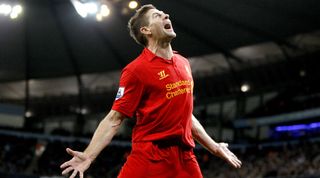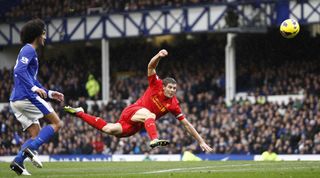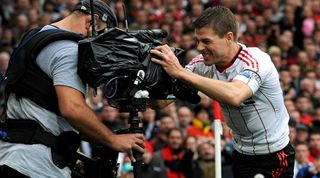Gerrard: I may be Liverpool's local lad turned hero, but I had a Man United shirt as a kid
The Anfield legend tells FFT's Ben Welch what it's like to come through the ranks at your local club and then become the main man...

Steven Gerrard’s eyes are firmly fixed on the table. He clutches a glass of water and slides it side to side. He affords himself a sheepish smile. FourFourTwo has just asked the Liverpool and England captain what it’s like to have an FA Cup final named after him.
He pauses, before finally breaking the silence. “It’s flattering when people say that, but I think it would be very disrespectful to my team-mates that helped win that cup to bask in any of that glory,” he replies.
Disrespectful? Maybe, but well within his rights. In 2006, Liverpool were trailing West Ham United 3-2 at the Millennium Stadium. With the game in stoppage time, having already made one and scored one, Gerrard hit a stunning 35-yard net-buster to level the scores. If that wasn’t enough, he scored from the spot during the shootout to help Liverpool win their seventh FA Cup.
Very few players produce a Roy of the Rovers moment like this in their career – and even fewer get to do it for their boyhood team – but for Gerrard it has become his trademark. His heroic exploits read like a roll of honour: Olympiakos 2004, AC Milan 2005, West Ham United 2006, Marseille 2008 and Atletico Madrid 2008. With so many medals of honour pinned to his chest, Gerrard has cemented himself as a symbol of the city and the club.
Growing up on Ironside Road, Huyton, just adds to his mythical status in Liverpool.
“Up until the age of eight I could have supported anyone. When I was younger I had all kinds of different kits: Tottenham, Norwich, Real Madrid, Barcelona... I even had a United kit,” he admits to FFT.
“We had a few Everton fans in the family who were trying to get me down the Blue road, but once I started understanding the game and listening to my dad and brother talk about Liverpool’s great history, that was it.”
Get FourFourTwo Newsletter
The best features, fun and footballing quizzes, straight to your inbox every week.

Inspired by Liverpool’s all-conquering team of the 1980s, Gerrard started making waves locally with Sunday leaguers Whiston Juniors, earning him a trial with the Reds when he was eight. Former Kop legend and then academy director, Steve Heighway, was blown away.
“We knew from the age of 14 he was going to make it,” recalled Heighway. “We took him on an under-18 tour of Spain when he was 13 or 14, which I’ve never done with a player, before or since. His gift was so massive.”
With other clubs sniffing around the Bluebell estate’s rough diamond, Heighway played his trump card – Anfield. “When I started training with Liverpool, Steve Heighway took a big interest in me and used to treat me to tickets for games,” says Gerrard.
“Anfield was mind-blowing. I was fascinated by the noise. I’d only ever seen games on TV, so to actually be there and be part of the atmosphere really grabbed me, and that’s when the dream started.”
Early promise
Aware they had a potential star on their hands, Liverpool offered Gerrard a seven-year deal when he was just 14.
He soon found himself facing up to players he had imitated on the playground – an unsettling experience, as Gerrard recalls.
“I was surrounded by multi-millionaires who had 60-70 international caps and 500 career appearances – I felt very intimidated,” he admits. “It was weird to be sitting there, surrounded by those players who were once heroes of mine.”
The scouse fraternity of Robbie Fowler, Steve McManaman and Jamie Carragher were quick to take the tall, skinny lad under their wing, but it was two lads from down south who helped Gerrard understand what it meant to wear the liver bird on your chest. “I studied Paul Ince and Jamie Redknapp on and off the pitch to see how they behaved,” says Gerrard.

“I watched how they ate, how they dressed, what cars they drove and how they were when I asked them to sign stuff. Every day I was logging stuff that I still use to this day.”
After all the hype, things didn’t start well for the future PFA Player of the Year. Gerard Houllier sent an 18-year-old Gerrard on for the closing minutes of a 2-0 home win against Blackburn in 1998. Beset with nerves, he sent an over-hit cross into the upper reaches of the Centenary Stand. His first start against Tottenham was even worse.
Playing to the cheers of the White Hart Lane faithful, David Ginola welcomed Gerrard to the elite with a masterclass in mickey-taking.
Lingering doubts
“When I first started playing for Liverpool there were times when I didn’t feel like I belonged there,” he says. “If I had a bad session or there was a one-on-one incident where someone got the better of me, I questioned whether I was good enough. But with every training session, every game, I was growing and learning from players.”
And how. By the following season he was a first-team regular and opened his account for the Reds against Sheffield Wednesday, marking the first time he “felt like a Liverpool player”. Before he had time to catch breath he was on a plane to Euro 2000 with England.
What followed over the next 14 years for club and country has been nothing short of epic. In 2003 he succeeded Sami Hyypia as Liverpool captain and has gone on to win almost every club medal in football, including the FA Cup, Champions League and UEFA Cup.
The Premier League title remains elusive, as do international trophies, but the current England skipper has served his country with passion and endeavour, collecting 114 caps before retiring from international football after last summer's World Cup.

But for Gerrard, nothing will eclipse that night in Istanbul. Three goals behind to Milan at half-time in the Champions League final, no one believed Liverpool could come back from the dead – until Gerrard’s 54th-minute header, that is. Driven forward by their captain, Liverpool levelled the scores and went on to win on penalties, completing one of the greatest comebacks of all time.
Playing for your boyhood team would be a dream come true for the average fan. For Gerrard, representing his team evolved beyond fantasy.
“When I’m out there and things are not going well, I’m like a fan. That’s why a lot of times I’ve produced and sometimes I haven’t – because I’ve put too much pressure on myself,” he explains. “Istanbul was the best night I’ve had in a Liverpool shirt, but when you’re a local lad, the expectation and demands become so big that when you actually become part of the club’s history you’re relieved.”
And it’s not just the club but also the city that benefits from Gerrard’s commitment.
The Steven Gerrard Foundation, set up in 2011, works with underprivileged, poorly and disabled children and young people in Liverpool and beyond, and the player is hands-on. “The easy thing to do in this position is to carry on thinking about yourself and go about your life,” explains Gerrard. “I wanted to take the challenge on of helping kids in need. It’s a good buzz knowing I am helping in some way and I’m enjoying it.” All proceeds from the player’s testimonial match next month will be going to the charity.
However successful Gerrard’s career turns out to be, one constant has remained since he made the journey from the stands to the pitch: he embodies the traditions and ambitions of the Anfield faithful. He’s one of them. This is what makes him a proper local hero.
“The fans mean everything to me. They’re who I play for.”
For more information visit stevengerrardfoundation.org
This interview originally featured in the August 2013 issue of FourFourTwo magazine. Subscribe!

'David Beckham was desperate to play in my squad, but I didn't want to bring him along and waste the FA’s money: I had to pick the strongest players': Great Britain coach reflects on Becks snub as 'one of the toughest decisions' of his career
‘Big Sam gets a bad rap as a bit of a dinosaur, but that couldn’t be further from the truth. He was ahead of the curve on many things – I loved playing for him’: Ex-Bolton star sets record straight on Allardyce